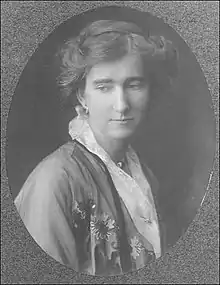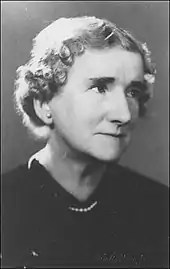Ursula Bethell
Mary Ursula Bethell (6 October 1874 – 15 January 1945), was a New Zealand social worker and poet. Although she considered herself "by birth and choice English", and spent her life travelling between England and New Zealand, she was one of the first distinctively New Zealand poets and is recognised today as a pioneer of modern New Zealand poetry.[1][2]
Ursula Bethell | |
|---|---|
 Ursula Bethell, c. 1900 | |
| Born | Mary Ursula Bethell 6 October 1874 Horsell, Surrey, England |
| Died | 15 January 1945 (aged 70) Christchurch, New Zealand |
| Pen name | Evelyn Hayes |
| Occupation |
|
Background and social work
Bethell was the eldest daughter of the well-to-do sheep farmer Richard Bethell and his wife Isabel Anne, née Lillie, and was born in Horsell, Surrey, England, in 1874.[3] Her parents had both lived in New Zealand in the 1860s, but returned to London where they married.[1][3] Shortly after her birth, in 1875, her parents returned with her to New Zealand, where her two younger siblings were born.[4] She was educated at Rangiora Primary School and Christchurch Girls' High School. Her father died in 1885.[1] She travelled back to England at age 15 and boarded with the family of Ruth Mayhew, who became a lifelong friend,[5] as she attended Oxford High School for Girls and a Swiss finishing school. She returned to New Zealand in 1892 and devoted herself to charitable work,[6] before again returning to Europe in 1895 to study painting in Geneva and music in Dresden.[4] Having enough private wealth to support herself, she took up social work in London with the Anglican organisation Women Workers for God, or "Grey Ladies". She continued to perform social work in a religious context in England and New Zealand, travelling between the two, including in the war years.[1][6]
In 1924 Bethell permanently settled in New Zealand, in the Cashmere Hills near Christchurch.[1] She bought a newly built home, Rise Cottage in Westenra Terrace, which she shared with another returnee New Zealander, Effie Pollen.[1][7] The theory that Bethell's relationship with Pollen was homosexual (which would have sat ill with her Anglicanism and her social aspirations in that period) was explored in some detail by the fellow poet Janet Charman, as a visiting scholar at the University of Auckland in 1997.[8] Bethell herself described the relationship as "prevailingly maternal", but there is no way of knowing for certain what the relationship between the two was, beyond that it was clearly a close and loving relationship.[1]
Poet and salonnière

Bethell only began to write poetry at the age of about fifty, and most of her poetry was written during her years living at Rise Cottage with Pollen.[6] At first she had no intention of publishing her poems but wrote them as messages that she would send in letters to her friends.[1] She was deeply affected by Pollen's death in 1934, writing to a friend that the event was "a complete shattering of my life ... from her I have had love, tenderness, and understanding ... and close and happy companionship".[6] She wrote little more afterwards,[4] so that most of her output dates from the single decade of 1924 to 1934. Vincent O'Sullivan said, "She was surprised that people admired her 'garden' poems, often written as casual messages to friends.... By the late 1920s, she was also writing the more deliberate and intellectually adventurous poems which took their place in her later two books."[7] After Pollen's death, she sold Rise Cottage and moved into a room in a house she had gifted to the Anglican church.[6]
Her first collection, From a Garden in the Antipodies (1929), is her best-known work, and its poems have been frequently anthologised. It demonstrated an awareness of her separation from "loved and lost London", as well as the themes of religious thought and nature that characterised all her work. Her later collections included poems for which there had not been a place in the first collection, as well as memorial poems to Pollen.[6] Her poetry is described by the Oxford Companion to Twentieth-Century Literature in English as characterised by "a plainness and spareness (as well as freshness of image) which distinguishes it from the more ornamented verse the country had previously produced".[9]
When the New Zealand writer Charles Brasch visited Bethell in the late 1930s, he found her at "the centre of an astonishingly diverse circle of interesting people, many of the younger of whom were so close to her that she almost directed their lives".[10]:302 These included the crime writer Ngaio Marsh, the essayist M. H. Holcroft, the artists R. H. Field and Evelyn Margaret Page, the poets Blanche Edith Baughan and J. H. E. Schroder, and the musician Frederick Joseph Page.[10]:304 She acted as a mentor to younger local poets, most notably Allen Curnow and Denis Glover.[9]
All Bethell's work appeared anonymously, as she felt that publicity in "provincial New Zealand" would be a "painful affair".[1] She said her pseudonym, Evelyn Hayes, came from a great-great-grandfather, Sir Henry Hayes of Cork, who was "deported for life to Botany Bay for attempted abduction of a Quaker heiress."[11] In later life, she became less keen to be anonymous, and before her death asked that her collected poems be published under her own name.[1]
Death and legacy
Bethell died in Christchurch on 15 January 1945.[7] A volume of her Collected Poems was published posthumously in 1950, and reprinted in 1985 with an introduction by O'Sullivan.[9] In 1948, after her death, a number of New Zealand authors published personal reflections in Landfall. The educator and writer Crawford Somerset said "New Zealand has produced no other poetry so clearly original and so delicately sensitive as Ursula Bethell's".[12]:281 The poet and journalist D'Arcy Cresswell said that in literary terms, "New Zealand wasn't truly discovered, in fact, until Ursula Bethell, 'very earnestly digging', raised her head to look at the mountains. Almost everyone had been blind before."[12]:283
She featured prominently in both of Curnow's notable anthologies, A Book of New Zealand Verse 1923–1945 (1945) (in which 19 of her poems were printed, more than any other poet)[7] and The Penguin Book of New Zealand Verse (1960), and later in The Penguin Book of New Zealand Verse (1985) edited by Ian Wedde and Harvey McQueen.[13]
In 1979, the University of Canterbury established the Ursula Bethell Residency in Creative Writing to support and encourage New Zealand writing. It is awarded to writers of "proven merit" and notable recipients have included Margaret Mahy, Keri Hulme and Eleanor Catton.[2]
Published works
- (As Evelyn Hayes) From a Garden in the Antipodes (London: Sidgwick and Jackson, 1929)
- (As "The Author of Poems From a Garden in the Antipodes") Time and Place (Christchurch: Caxton, 1936)
- (As "The Author of Time and Place") Day and Night: Poems 1924–1934, (Christchurch: Caxton, 1939)
- Collected Poems, ed. Helen Simpson, (Christchurch: Caxton Press, 1950), (Kindle edition 2016, ASIN: B016QNELZ4)
- Collected Poems, ed. Vincent O’Sullivan, (Wellington: Victoria University Press, 1985 [1950])
- Vibrant with Words: The Letters of Ursula Bethell, ed. Peter Whiteford (Wellington: Victoria University Press, 2005). ISBN 9780864735041
References
- Whiteford, Peter (June 2008). "Ursula Bethell, 1874–1945". Kōtare: New Zealand Notes & Queries. 7 (3): 90. doi:10.26686/knznq.v7i3.707. Retrieved 14 December 2020.
- "Ursula Bethell Residency in Creative Writing". University of Canterbury. Retrieved 14 December 2020.
- Laura, Valerie. "Mary Ursula Bethell". Dictionary of New Zealand Biography. Ministry for Culture and Heritage. Retrieved 10 December 2011.
- The Feminist Companion to Literature in English, ed. Virginia Blain, Patricia Clements and Isobel Grundy (London: Batsford, 1990), p. 90.
- Whiteford, Peter. "Secrets of Felicity: Letters of Ursula Bethell". New Zealand Electronic Poetry Centre. Retrieved 14 December 2020.
- Whiteford, Peter (2006). "Bethell, (Mary) Ursula". In Robinson, Roger; Wattie, Nelson (eds.). The Oxford Companion to New Zealand Literature. Oxford University Press. doi:10.1093/acref/9780195583489.001.0001. ISBN 978-0-1917-3519-6. OCLC 865265749. Retrieved 14 December 2020.
- O'Sullivan, Vincent (1997). "Introduction". Ursula Bethell: Collected Poems (2nd ed.). Wellington, New Zealand: Victoria University Press. Retrieved 14 December 2020.
- Janet Charman: "My Ursula Bethell", Women's Studies Journal 14.2 (Spring 1998), pp. 91–108 Retrieved 8 April 2015.
- Stringer, Jenny, ed. (2005). "Bethell, Ursula". The Oxford Companion to Twentieth-Century Literature in English. Oxford University Press. ISBN 978-0-1917-2757-3. Retrieved 14 December 2020.
- Brasch, Charles (1980). Indirections: A Memoir 1909–1947. Wellington, New Zealand: Oxford University Press. ISBN 0-19-558050-8. Retrieved 12 December 2020.
- Letter to Sidgwick and Jackson, Bethel's London publishers, July 1929. Quoted by O'Sullivan.
- "Ursula Bethell: Some Personal Memories". Landfall. 2 (4). December 1948. Retrieved 14 December 2020.
- Wedde, Ian; McQueen, Harvey, eds. (1985). The Penguin Book of New Zealand Verse. Auckland, New Zealand: Penguin. ISBN 978-0-1404-2333-4. Retrieved 14 December 2020.
External links
- Ursula Bethell, author page at the New Zealand Electronic Poetry Centre
- Bethell, (Mary) Ursula, profile at Read NZ Te Pou Muramura